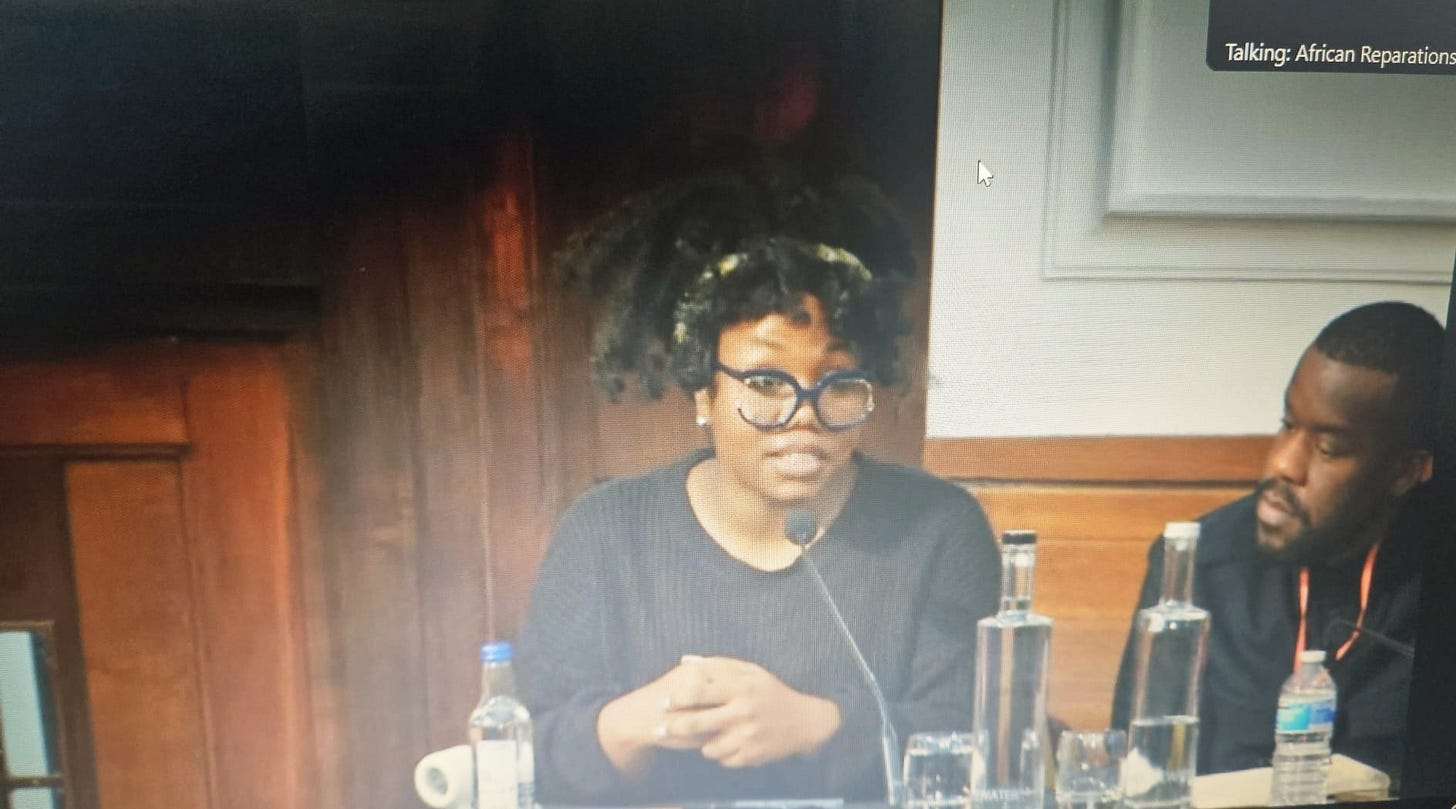“What’s incentivising us to rally behind slavery reparations?”
At the UK Reparations Conference, Nadine White delivered a speech reflecting on fractured ties between the Caribbean and its diaspora
At the UK Reparations Conference on Saturday 18 October 2025, Black Current News editor Nadine White delivered a powerful address exploring how true reparatory justice requires not only structural change but also solidarity between the Caribbean and its diaspora.
Speaking on the Racial Justice panel, chaired by veteran activist Lee Jasper, Nadine reflected on the continuing legacies of enslavement and colonial exploitation, calling for renewed unity among global African communities.
Her speech challenged CARICOM leaders, campaigners and citizens alike to consider what inclusion really looks like - and what stands in the way of collective repair.
Below is the complete text of Nadine’s speech as prepared for delivery at the UK Reparations Conference, hosted by the All-Party Parliamentary Group (APPG) for Afrikan Reparations in Friends House, Euston, London.
Time constraints meant only part of it was read on the day.
Good afternoon, everyone.
It’s an honour to join you for this important discussion and I want to thank the organisers for bringing us together at such a critical moment in our collective journey toward reparatory justice.
As a journalist and filmmaker, my reporting has often focused on the ongoing legacies of race and inequality in Britain - from the Windrush scandal to disparities in housing, education, health and the justice system.
What’s clear is that the racism experienced today isn’t accidental; it’s the continuation of centuries of enslavement and colonial exploitation that were never truly accounted for.
Reparatory justice, then, isn’t just about money - it’s about structural change. It’s about policy reform, truth-telling, and the dismantling of systems built on racial hierarchy. It’s about ensuring that the next generation of African people - Black Britons, Caribbean people - are not still paying a price for history’s crimes.
The CARICOM Ten-Point Plan lays out a solid framework from formal apologies and education reform to debt cancellation and public health initiatives.
But I think a real challenge, particularly for those of us in the Caribbean diaspora here in the UK, is understanding where we fit within that agenda.
Because if we’re honest, the relationship between the diaspora and our home nations can feel fractured.
Too many of us can’t even get a call returned from our embassies or face endless bureaucracy trying to obtain citizenship by descent, for example.
I’ve heard from so many people across the Caribbean diaspora who feel that second, third and fourth-generation Caribbean people are only really celebrated when we “make it” - when we become celebrities or export success stories.
Until then, we exist in a kind of limbo: too Caribbean to be fully British, yet not fully embraced by the Caribbean itself.
So my question - and my challenge - is this: what is incentivising us, as diasporians, to rally behind reparations movements when we’re still struggling to be recognised as part of the Caribbean family?
If we are to truly move towards reparatory justice, our approach must be inclusive - it must account for the millions in the diaspora who carry both the trauma and the pride of our ancestors’ survival.
Reparations cannot only be negotiated in government offices or international summits; they must also be lived, felt and practised within our own communities through unity, access and mutual respect.
I believe our power lies in storytelling, in truth-telling and in bridging that gap between the region and its global children. Repairing those ties among ourselves will be essential in achieving the cohesion that’s required across the diaspora, so we can collectively lobby entities for reparations.
There’s also another issue we have to confront honestly: public engagement.
Across the diaspora, many people are disengaged from the reparations conversation - not out of apathy but disconnection. They don’t believe it will touch their lives in any tangible way. They don’t understand how reparations would work in practice, what it would look like in real terms or how it would be distributed.
For some, it feels too abstract and inaccessible.
And for others, it feels unattainable, like something that will never happen within our lifetime.
That sense of distance is dangerous, because a movement that’s not rooted in the everyday realities of our people risks losing moral power and political traction.
If reparations are to succeed, they must be communicated in ways that resonate - showing how justice for our ancestors links directly to opportunity, dignity and equality for us and our children.
A public education programme is worth exploring to this effect.
Reparations mustn’t be seen as a theoretical ideal but as a practical path to repair the damage we still live with today.
Thank you.



Good speech. I agree with the premise that reparations need to be tangible and 'felt' by the community. Appreciate all you are doing. Love and Respect xCx
IBIS — the ic3 Black International State — offers one practical answer to every issue raised here: inclusion, access, clarity and everyday impact. It welcomes diaspora without gatekeeping (simple “registry of interest”), turns reparations from abstract to accountable via Reparation Liability Tokens (RLT) governed by IBIS, and directs spending toward repair through Justice Trade Certification (JTC) (issued only by IBIS). Add a public-education programme and you get unity + standards + real-world benefits — not just rhetoric. Learn more: https://ic3csi.com